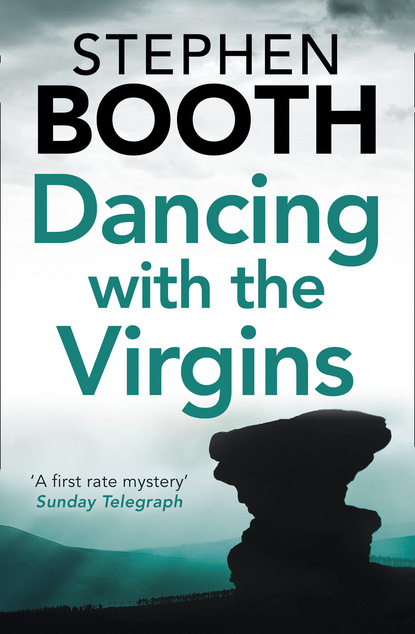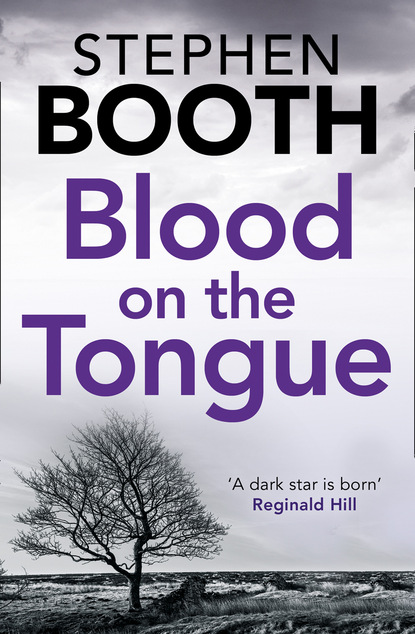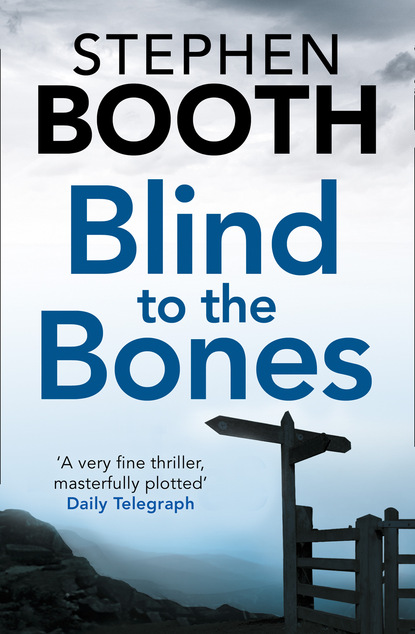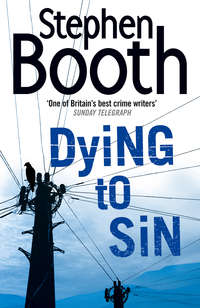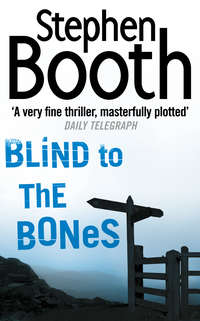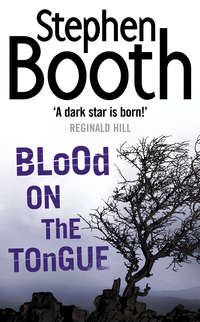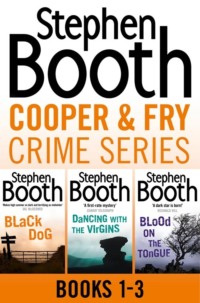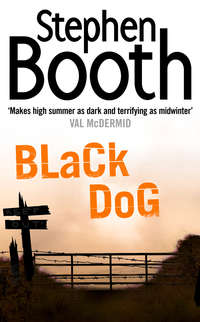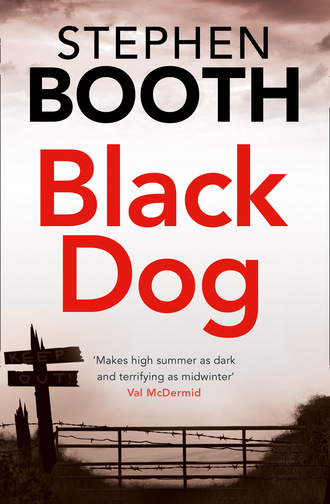
Полная версия
Black Dog
‘They reckon it was her all right,’ said Harry.
‘Poor little thing,’ said Margaret. ‘She was only a kiddie. Who would do a thing like that, Helen?’
‘She was fifteen. Would you like some tea?’
‘Fifteen. Just a child. They gave her everything, her mother and father did. A private school, her own horse. All that money, just think of it. And look what it comes to.’
‘I wonder what Graham Vernon will think,’ said Andrew.
‘What do you mean, Dad?’
‘Well, it’s awkward. You know – just imagine what state he’s in over the girl. And then it has to be my own father-in-law who finds her.’
‘What does that matter to him, for heaven’s sake? Their daughter’s dead – it won’t make any difference to them who found her.’
‘Well, it’s just awkward, that’s all.’
‘Andrew thinks his role is to be Graham Vernon’s loyal lackey,’ said Margaret. ‘Being involved in the murder of his daughter rather ruins the image, doesn’t it?’
‘Involved? Well, hardly,’ protested Andrew.
‘However distantly, of course,’ said Margaret, with a smile of satisfaction. ‘I suppose it’s bound to make you feel tainted by association.’
‘Stop it, Margaret.’
‘Perhaps it would have been better if Dad had just walked on and ignored it, and said nothing. Better for you, anyway. I’m surprised he didn’t think of your reputation at the time. It was very remiss of you, Dad.’
Harry took his empty pipe out and sucked on its stem, looking from one to the other. Helen thought he was the only one of them who was enjoying the conversation.
‘Anyway, they haven’t much of a reputation up there to be worried about, have they?’ said Margaret.
‘That’s not fair. The Vernons are very well-respected.’
Margaret snorted contemptuously. ‘Respected. Not in this house. What do you say, Dad?’
‘Rich buggers. Ignorant rubbish.’
Helen smiled. ‘That needed saying too. They’ve done enough to this family. Why should we let something like this affect us? I’m sorry for their trouble, but it’s their trouble, not ours. It’s nothing to do with Granddad. Blow the Vernons. We have to see that Grandma and Granddad are all right.’
‘Of course we do. Andrew?’
‘Well, all right.’
‘We’re lucky we’re a proper family and can stand together,’ said Margaret. ‘Not like them up there. That’s been their problem, of course. That’s been the cause of all the trouble in the past. They don’t know what a family should be. And that’s the cause of this bit of trouble, too, you’ll see.’
‘We should talk about it,’ said Helen. ‘We should have talked about it before.’
‘He won’t,’ said Gwen. ‘He won’t talk about it to anybody.’
‘There’s no need for it,’ said Harry. ‘Let it rest.’
Helen stood by his chair and put her hand on his arm. ‘Granddad?’
He patted her hand and smiled up at her. ‘Believe me, lass, there’s no need.’
She sighed. ‘No, we’ve never talked about anything important, have we? Not ever, in this family. Except when we were angry or upset. And that’s not the time to talk. It’s not the time to do anything.’
‘Well, I don’t know what you mean by that, I’m sure,’ said Margaret. ‘I’m as capable as anyone of talking things over without getting upset about it.’
Margaret’s voice was becoming high-pitched. She tossed her head and fiddled with an earring, glaring at her husband as if challenging him not to support her. But Andrew turned away with sagging shoulders and found himself staring into the mournful eyes of Jess, who had crept into the corner of the room to listen. The dog’s ears twitched from side to side as she assessed the sound of their voices, trying to judge the mood and looking dejected at what she heard.
‘There was no need for you to come here, you know,’ said Harry. ‘No need at all. We were managing perfectly well, us and Helen.’
‘We could hardly stay away at a time like this,’ said Margaret. ‘We’re your family, after all.’
Harry stood and walked slowly to the stairs. ‘I’ll be going out for a while,’ he said.
And before anybody could ask him where to, he had disappeared. They could hear water running and the sound of a wardrobe door creaking above them through the ancient floorboards.
‘Where is he going?’ asked Andrew.
‘Not to the pub, surely?’ said Margaret. ‘Not at a time like this.’
‘Oh, yes,’ said Gwen. ‘He’ll be going to meet them.’
Half an hour later, Harry had escaped from the cottage and was settled into an entirely different atmosphere, where he didn’t need to be prompted to tell his story. When he had finished, it required a moment of quiet contemplation, a few swallows of beer, a companionable silence to emphasize the seriousness of the occasion.
‘Well, Harry. Police and all.’
‘Oh aye, them, all right, Sam. A bucketload of ’em.’
‘Making a nuisance of themselves, I suppose?’
‘They try, some of them. But they don’t bother me.’
The corner of the Drover between the fire and the window smelled strongly of old men and muddy dogs. The seats of the wooden settles the men sat on were worn smooth to the shape of their buttocks, and their boots seemed to ease themselves into familiar depressions in the dark carpet tiles.
Sam Beeley had rested his stick against the table. Its ivory handle, shaped like the head of an Alsatian dog, stared at the beaten brass surface with contempt. Occasionally, Sam stroked the ivory with a bony hand, fondling the Alsatian’s worn ears in his yellow fingers, or tapping it with a twisted thumbnail on the corner of the brass. His knees cracked when he moved, and he shuffled his toes uncomfortably in soft suede shoes as if he was unable to find a position that did not give him pain. He was the thinnest of the three men, but his thinness was almost masked by the multiple layers of clothes that he wore, despite the warmth of the evening. The emaciation showed most in his hands and in his face, where the flesh had sunk into his cheeks and his eye sockets were dark pools where weak blue eyes flickered.
‘Bloody coppers,’ he said, his voice rough with cigarette smoke. ‘What do you reckon, Wilford?’
‘We can do without ’em, Sam.’
‘True enough.’
‘Oh aye.’
Wilford Cutts had removed his cap to reveal a tangle of white hair around a pale scalp that contrasted sharply with the ruddy colour of his face. He had an untidy white moustache and a suggestion of sideburns that might once have been bushy around his ears. His neck was thick and sinewy and ran into heavy shoulders that could no longer be called well-muscled, but sagged forward into his sweater, soft and fleshy. His palms were stained with grime, and his fingernails were dark against the side of his beer glass. Dark fibres clung to his corduroy trousers, which were worn at the knees and stiff at the calves, where they were tucked into grey woollen socks. He kept his feet pushed out of sight under the bench, in case the landlord should notice the caked soil drying on the soles of his boots.
‘So it’s what they call a murder enquiry then, is it, Harry? They’ve worked out what happened to the lass?’
‘They didn’t say, Wilford.’
‘No?’
‘No.’
‘Bloody coppers.’
Harry was keeping his cap firmly in place. He was the centre of attention, the man of the moment, but it didn’t do to get too excited. He had put on a clean shirt to walk to the pub, and a tie with a discreet paisley pattern fastened neatly round his throat. His feet were thrust out in front of him into the room, where the wall lights were reflected in his polished toecaps.
Now and then one of the pub’s customers would call to him across the room, and he acknowledged their greetings with a brief nod, not uncivil, but deliberately reserved. He stared, tight-lipped, at a group of youths and girls he didn’t recognize, who were laughing noisily at the far end of the bar, trying to talk above each other and now and then breaking into bursts of song.
By unspoken consent, Sam sat closest to the fire, although it was summer and the grate was empty. Wilford sat furthest away, with his back to the door, hidden in the shadow of the alcove. There were two pints of Marston’s Bitter and a half of stout on the table, next to a heap of well-worn dominoes which had been emptied from their box and left untouched. With the round of drinks had come a packet of smoky bacon crisps, which Wilford slid into his pocket.
‘And how are the family bearing up?’ said Sam. ‘Bit of a shock for the womenfolk, no doubt.’
Harry shrugged. ‘That son-in-law of mine is the worst by a long chalk,’ he said. ‘He can’t stand it at all. Worried about his precious job with Vernon.’
‘He’d crack like a nut, that one. Sorry to say it, Harry. But if he had anything to hide, if he ever found himself under suspicion. He’d cough, all right.’
The slang expression brought a small smile to Harry’s face. Like Sam, he had heard it used last night in the latest television police series, set in some drug-ridden area of inner London, where the detectives were more like criminals than the criminals themselves.
‘Has he?’ asked Wilford suddenly.
‘Has who what?’
‘Has Andrew Milner got anything to hide?’
‘You must be joking,’ said Harry. ‘Our Margaret knows every hole in his socks. The poor bugger couldn’t hide a pimple on his arse.’
‘The police are useless, anyway,’ said Sam. ‘They never know who to talk to, what questions to ask. If they solve anything, it’s by luck round here.’
Wilford laughed. ‘Not like on the telly, Sam.’
‘Well, on the telly they always sort it out. That stands to reason. They’re just stories. There wouldn’t be much point putting them on the telly otherwise, would there?’
‘I suppose it’s a sort of warning to people, like,’ said Wilford. ‘It’s telling them not to commit murders and crimes, because they’ll get caught, like they always do on the telly.’
‘But they don’t really get caught,’ said Sam. ‘Not in real life they don’t. Half of ’em never get found out. And those that do get caught are let off by the judges. They get probation or one of them other things.’
‘Community service,’ said Harry. He pronounced the words carefully, as if he had never actually heard them spoken but had only seen them as an unfamiliar combination of syllables printed in the court reports of the Buxton Advertiser.
Sam curled his lip. ‘Aye. Community service. When was that ever a punishment for a crime? Making ’em do a bit of honest work. It’s just like letting them off. It’s true, you can get away with owt these days. Murder, even.’
‘But the people who watch the telly don’t know that,’ said Wilford. ‘Mostly they have no idea. They think it is real life on the box. The kids today. And the women, of course. They don’t know the difference. They think when there’s a crime Inspector Morse comes out and works it all out in the pub with a pencil and a bit of paper and the murderer gets banged up.’
‘Banged up, aye. For life.’
They lapsed into silence again, staring at each other’s drinks, trying to imagine the reality of spending the rest of their lives in prison. A life sentence might mean ten, twenty or thirty years – it was all the same for a man in his late seventies or eighties. He would never be likely to see the outside again.
‘You’d miss the open air something terrible in prison,’ said Sam.
The other two nodded, their heads turning automatically to the window, where, even in the dusk, the outline of the Witches could be made out against the southern sky, jagged and black on the horizon of Win Low. A ripple of unease ran round the table. Sam shivered and clutched at his stick, rubbing the ivory as if seeking comfort from its smooth shape. Wilford ran his hands nervously through his untidy hair and reached for his glass. Even Harry seemed to become more tight-lipped, a shade more cautious.
‘No. You couldn’t be doing with that,’ he said. ‘Not at all.’
The three old men looked sideways at each other, unspoken messages passing between them in the tentative movements of their hands and the tilting of their heads. It was a level of communication they had learned in their working lives, when they had been isolated from the rest of the world in their own enclosed space, where conversation was unnecessary and at times impossible. At such moments, they could still cut themselves off from the world around them, pushing the noise and bustle of the pub into the distance as effectively as if they had been sitting in one of those dark tunnels a mile underground, far from the surface light.
Sam fumbled a packet of ten Embassy and a box of matches from somewhere among his clothing and lit a cigarette, squinting his pale eyes against the cloud of smoke that hung in the still air, obscuring his face. Wilford ran his dirt-stained fingers through his hair, momentarily revealing an unnaturally white patch of naked scalp at the side of his head, where the skin was stretched thin and tight like paper. Harry fiddled with his unlit pipe, poking a few dominoes about the table with the stem, separating the tiles that were face down. He stared at them fixedly, as though hoping to read their numbers through their patterned backs.
‘There are some that would have a troubled conscience, though,’ suggested Wilford. ‘They say that can be as bad as anything anybody else can do to you.’
‘It can drive folks mad,’ agreed Sam.
‘Like being in your own hell, I reckon. That would be punishment, all right.’
‘Worse than community service, any road.’
‘Worse than prison?’ asked Harry.
They looked unsure about that. They were picturing a narrow, confined cell and bars, the knowledge of hundreds of other men crowded together like ants, allowed out into a yard for an hour each day. Shut away from the light and the air for ever.
‘You’d have to have a conscience to start with, of course,’ said Wilford.
‘There aren’t many that have one these days,’ agreed Sam.
They both looked at Harry, waiting for his response. But Harry didn’t seem to want to think about it. He got up stiffly, collected their glasses and walked across the room to the bar. He looked to neither right nor left as he moved through the crowd of youngsters, his back upright, like a man entirely apart from those around him. Drinkers parted automatically to let him through, and the landlord served him without having to be told the order.
Harry’s jacket and tie looked incongruously formal and sober among the T-shirts and shorts of the other customers. He could have been an elderly undertaker who had wandered into a wedding reception. When he turned his head, the peak of his cap swung like a knife across a background of pink limbs and sunburnt faces.
‘So the bloke who killed this lass,’ said Harry when he returned to the corner table. ‘Do you reckon he’ll get away with it?’
‘Depends,’ said Wilford. ‘Depends whether the coppers have a bit of luck. Perhaps somebody saw something and decides to tell them about it. Or some bobby asks the right question by accident. That’s the only way it happens.’
‘They have their suspicions, no doubt.’
‘It doesn’t matter what they suspect. They can’t do anything without evidence,’ said Wilford confidently.
‘Evidence. Aye, that’s what they’ll want.’
‘They’ll be desperate for it. Desperate for a bit of evidence.’
‘They reckon that Sherratt lad has gone missing,’ said Sam.
‘Daft bugger.’
‘It’ll keep the coppers busy, I suppose, looking for him. He’ll be the number one suspect.’
‘Unless they fancy blaming it on one of the family,’ said Wilford. ‘That’s where they always look first.’
‘Aye,’ said Sam, brightening suddenly. ‘Or the boyfriend.’
‘Ah! Which boyfriend?’ asked Harry.
‘That’s the question. With that one, that’s the first question you’d have to ask.’
‘And only fifteen,’ said Sam.
They shook their heads in despair.
‘Well, that’s the best bit, eh, Harry?’
‘Oh aye,’ said Harry. ‘That’s the best bit. When they do all their enquiring, they’ll turn up all sorts. They’re bound to find out about those buggers at the Mount. The Vernons.’
‘Maybe when they do …’
‘… they won’t be so bothered about finding out who put the cat among their pigeons.’
‘Maybe,’ said Harry, ‘they’d even give him a medal.’
The youths at the other end of the pub turned in astonishment to stare at the three old men in the corner. For once, the laughter of the old men was even louder and more unnatural than their own.
Helen stood with her grandmother on the doorstep of the cottage, watching the lights of the Renault disappear past the bend by the church. The night was clear and still quite warm, and the stars glowed in a dark-blue blanket of sky. Only the streetlamps here and there and the security lights outside the Coach House and the Old Vicarage created areas that seemed truly dark.
‘It was nice to see Sergeant Cooper’s son, wasn’t it? He’s made a nice-looking young man.’
‘Yes, Grandma.’
‘Ben, is it?’
‘That’s right.’
‘He’s the one you used to bring round to the house after school sometimes, isn’t he, Helen?’
‘Only once or twice, Grandma. And that was years ago.’
‘I remember, though. I remember how you looked at him. And then you told me one day that you were going to marry him when you grew up. I remember that.’
‘All little girls get crushes like that. I don’t even know him now.’
‘I suppose so. But he has nice eyes. Dark brown.’
They turned back into the house. Helen noticed that Gwen was reluctant even to look into the kitchen, let alone go near the door, although the police had long since taken away the bloodstained trainer and the pages of the Buxton Advertiser with it.
‘They’ll be up at the Mount now,’ said Helen. ‘I don’t envy them the job. They have to tell Mr and Mrs Vernon what they’ve found.’
Her grandmother looked at the clock, fiddled with her cardigan, folded and unfolded a small piece of pink tissue from her sleeve.
‘One of them will have to go and identify the body, you know. I suppose he’ll be the one who does it. But it will hit her hard, Charlotte Vernon. Don’t you think so, Grandma?’
Gwen shook her head, and Helen saw a small tear gather at the corner of one eye, brightening for a moment the dry skin of her cheek.
‘I know I should do,’ said Gwen. ‘I know I should feel sorry for them, but I don’t. I can’t help it, Helen.’
Helen sat on the side of her grandmother’s chair and put her arm around her thin shoulders.
‘It’s all right, Grandma. It’s understandable. There’s no need to upset yourself. What if I make some hot chocolate, then there might be something you can watch on TV until Granddad comes back.’
Gwen nodded and sniffed, and found another piece of tissue that was still intact to wipe her nose. Helen patted her shoulder and began to move towards the kitchen until her grandmother’s voice stopped her. It sounded harsh and full of fear, and trembling on the edge of despair.
‘What’s going to happen to Harry?’ she said. ‘Oh dear God, what will they do to Harry?’
7
The mortuary assistant drew back the plastic sheet from the face with care. The relatives should never be allowed to see the injuries on the body, unless it was absolutely necessary. In this case, the face was bad enough, although it had been cleaned up as far as possible in the time they had been given. The maggots had been scooped away and bottled, the eyes cleaned and closed, the dried blood scraped off for testing. With the hair pushed back, the injuries to the side of the head were not readily visible.
‘Yes,’ said Graham Vernon, without hesitation.
‘You are identifying the remains as those of your daughter, Laura Vernon, sir?’ asked DCI Tailby.
‘Yes. That’s what I said, isn’t it?’
‘Thank you very much, sir.’
‘Is that it?’
‘It’s a necessary formality which allows the other procedures to get under way.’
The assistant was already drawing the sheet back over Laura’s face, returning her to the anonymity of the recently dead, until the postmortem examination could be completed.
‘Does one of your procedures involve catching my daughter’s murderer, by any chance, Chief Inspector?’ said Vernon, without taking his eyes from the body.
There was no need for Tailby to have been present in person when Graham Vernon identified his daughter’s body, but he saw it as a valuable chance to observe the reactions of relatives. He watched Vernon now as the man stepped away from the sheeted mound that had been his daughter. He saw his eyes linger with that familiar horrid fascination on the loose ridges and hollows of green plastic that concealed the dead girl’s face. Vernon’s hands moved constantly, touching his face and his mouth, smoothing his jacket, rubbing their soft fingers together in a series of involuntary gestures that could mean nervousness or barely concealed distress. His face told its own story.
Many parents and bereaved spouses had told Tailby that at this point their minds still refused to accept the reality of death. They would imagine their loved one sitting up suddenly and laughing at the joke, the sheet falling away from features restored to life and health. Was Graham Vernon thinking this now? Did he still see and hear a living Laura? And, if so, what was she telling him that made him look so afraid?
There was a fine line to tread in these cases. The family of a victim had to be treated with care and consideration. Yet ninety per cent of murders were ‘domestics’, in which a family member or close friend was responsible. Tailby was no longer moved by the various symptoms of distress displayed by relatives. It was a necessary ability in the job he did, this hardening of the emotions. Sometimes, though, he was forced to acknowledge that it had weakened him as a person; it was a long time since he had been able to form a close relationship.
‘You appreciate that we will need to talk to you and your wife again, sir,’ he said, when Vernon finally turned away.
‘There isn’t anything else I can tell you that I haven’t already.’
‘We need to know as much about Laura’s background as we can. We need to interview all her friends and associates again. We need to identify any links that we haven’t yet discovered. We need to trace her movements on the day she was killed. There’s a lot to be done.’
‘Just find Lee Sherratt!’ snapped Vernon. ‘That’s all you need to do, Chief Inspector.’
‘Enquiries are being made in that respect, sir.’
‘And what does that mean, for God’s sake?’
The two men walked out through the double doors into the corridor, attempting to leave behind the stink of antiseptic. Their footsteps echoed on a tiled floor as Tailby lengthened his stride to keep up with Vernon, who seemed to want to get away as quickly as possible.
‘We’ll find the boy, of course, sir. In time. I remain hopeful.’
Vernon stopped suddenly, so that Tailby couldn’t avoid bumping into him. They ended up almost eye to eye, though the detective was several inches taller. Vernon stared upwards with a ferocious scowl, his handsome face swollen into a grimace. His eyes were tired and shot with tiny red veins, and he had shaved unevenly on one side of his face.
‘I seem to remember you saying something like that before, Chief Inspector. Nearly two days ago. But that time you were assuring me that you would find my daughter.’
Tailby waited, not blinking in the face of Graham Vernon’s stare. ‘Yes, sir.’
‘But somebody else found her first. Didn’t they?’
Tailby recalled the painful scene earlier in the evening, when he had visited the Mount to break the news to the Vernons. He remembered the way that neither parent had shown any surprise on seeing him, only despair and resignation.
He also remembered Charlotte Vernon’s slow deterioration into sobbing hysteria, the retreat to a bedroom somewhere, and Graham Vernon’s phone call to their doctor. They had been both shocked and upset, of course. But they had reacted entirely separately – there had not been the smallest gesture of mutual support in the first moments after the bad news had been broken.




